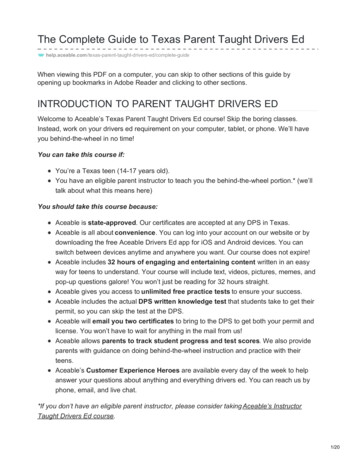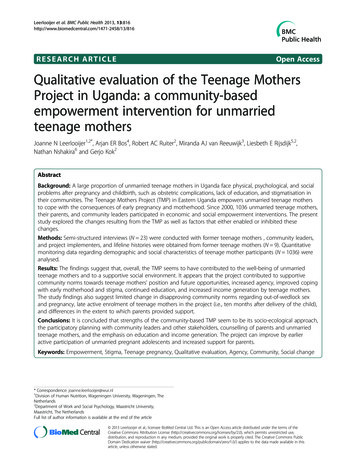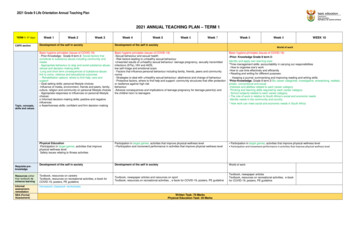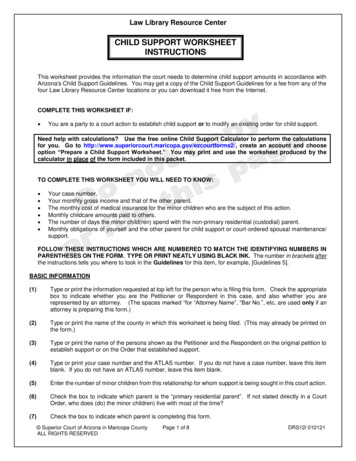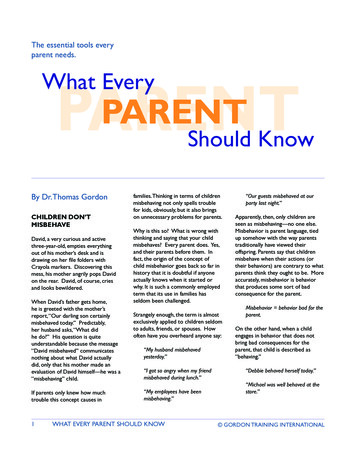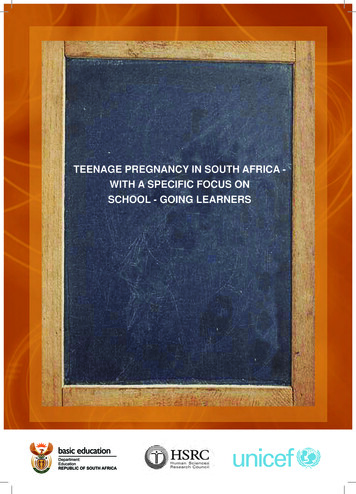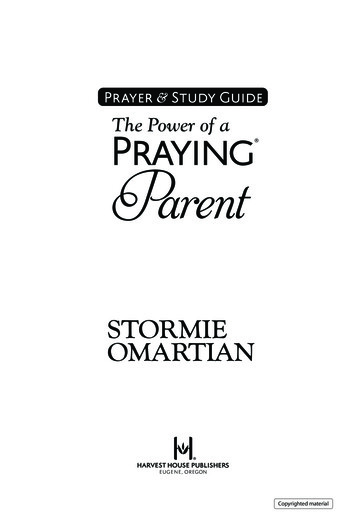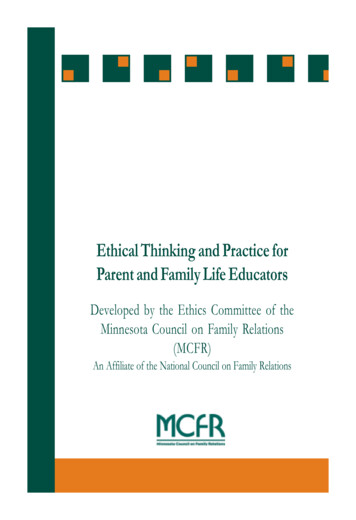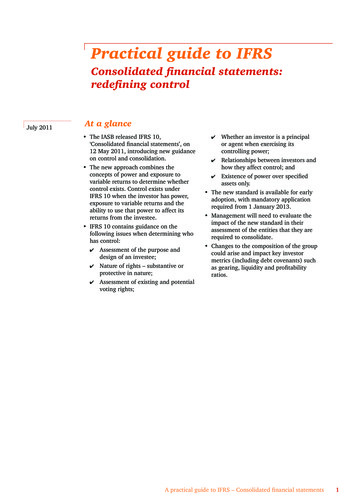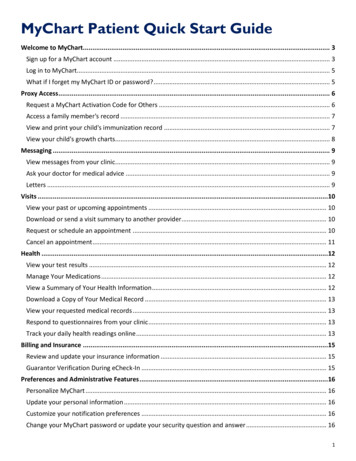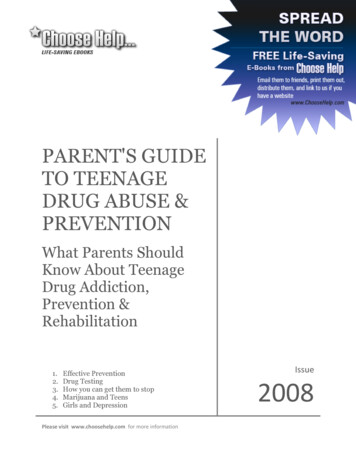
Transcription
PARENT'S GUIDETO TEENAGEDRUG ABUSE &PREVENTIONWhat Parents ShouldKnow About TeenageDrug Addiction,Prevention &Rehabilitation1.2.3.4.5.Effective PreventionDrug TestingHow you can get them to stopMarijuana and TeensGirls and DepressionPlease visit www.choosehelp.com for more informationIssue2008
PARENT'S GUIDE TO TEEN DRUG & ALCOHOL ABUSEWhat Parents Should Know About Teenage Drug Addiction, Prevention & Rehabilitation2008 IssueT ABLE OF C ONTENTSPREVENTION5DRUG TESTING – SHOULD YOU?11HOW TO SPOT TEEN SUBSTANCE ABUSE17TEENAGE GIRLS22THE REAL RISKS OF TEENAGE DRUG ABUSE25MARIJUANA AND TEENS32CRYSTAL METH AND TEENS37SO HOW CAN I GET THEM TO STOP?43DRUG REHAB49DON’T SEND A TEENAGER TO AN ADULT REHAB60PARENTS ALSO NEED HEALING64Visit www.ChooseHelp.com for more information, or call the 24-hours rehab hotline 1-877-830-7020 Copyright 2007 - 2008, ChooseHelp.com – All rights reserved.Page 2
PARENT'S GUIDE TO TEEN DRUG & ALCOHOL ABUSEWhat Parents Should Know About Teenage Drug Addiction, Prevention & Rehabilitation2008 IssueI NTRODUCTIONParents have a tough job. Drugs are everywhere, teens think that substances likeMarijuana are harmless, and you can't watch them every minute of the day, and norshould you.So how can parents keep kids safe, really get the message across thatexperimentation with drugs has some real consequences and still retain a good andtrusting relationship with a teenage son or daughter? Teens surely strive forincreased freedom and autonomy as you wish only to protect them from thedangers of the world.You can’t live their lives for them, but you can teach them the risks, you can getinvolved, and you can intervene if you do suspect or know of drug experimentationor abuse.The best way to fight drug abuse is to never let it grab a hold in the first place, andthe best time to start drug abuse prevention is as soon as kids are old enough tolisten and understand.However, teens so full of promise too often become ensnared within the pain andheartache of addiction, and for parents, watching the decline is tragic. Fortunately,parents never need sit idly by, and active and educated prevention and a strongresponse is always the best course of action to the threat of teen substance abuse.Visit www.ChooseHelp.com for more information, or call the 24-hours rehab hotline 1-877-830-7020 Copyright 2007 - 2008, ChooseHelp.com – All rights reserved.Page 3
PARENT'S GUIDE TO TEEN DRUG & ALCOHOL ABUSEWhat Parents Should Know About Teenage Drug Addiction, Prevention & Rehabilitation2008 IssueThis ChooseHelp.com E-Book offers life-saving advice: Learn how you can preventexperimentation, learn how to recognize the signs of drug use, and learn what typesof intervention and treatment are most appropriate for your situation.Learn when rehab is needed, and learn how to select a facility that's going to workfor you. Also learn about the dangers of specific drugs and the peripheral risks ofdrug abuse.Get educated, get empowered and start to make a real positive, and in some cases,life saving difference.WISHING YOU SUCCESS,JOHN LEECHOOSEHELP.COM, 2008Visit www.ChooseHelp.com for more information, or call the 24-hours rehab hotline 1-877-830-7020 Copyright 2007 - 2008, ChooseHelp.com – All rights reserved.Page 4
PARENT'S GUIDE TO TEEN DRUG & ALCOHOL ABUSEWhat Parents Should Know About Teenage Drug Addiction, Prevention & Rehabilitation2008 IssueCHAPTER 1PREVENTIONVisit www.ChooseHelp.com for more information, or call the 24-hours rehab hotline 1-877-830-7020 Copyright 2007 - 2008, ChooseHelp.com – All rights reserved.Page 5
PARENT'S GUIDE TO TEEN DRUG & ALCOHOL ABUSEWhat Parents Should Know About Teenage Drug Addiction, Prevention & Rehabilitation2008 IssueAddiction and drug abuse prevention begins in the home within the family, and although parents rightlybelieve that peer pressure and the influence of friends exerts a powerful force during the teenage years,kids who don’t drink or use drugs cite their parents' influence as the number one factor leading themaway from early abuse. Contrarily, the number one factor influencing kids that do abuse drugs andalcohol is the perception of permissive or lenient parenting styles.Sometimes parents do everything they can toward drug abuse prevention and ultimately end upheartbroken as their child succumbs to abuse and addiction, and some parents who make no effort inprevention have children that excel without ever experimenting with use and abuse; there are noguarantees in life and especially when parenting an adolescent, but parents do exert a major influence,and prevention always starts in the home.PREVENTION ADVICE FOR PARENTSDrug and alcohol abuse prevention begins with speaking to your kids about drugs.Most schools integrate some degree of drug education and drug avoidanceteachings into their curriculum, but sadly, although great resources have beenspent, these school-based educational programs have been found negligible in theirbenefits. Kids seem just as predisposed to try drugs and alcohol after participating inschool and community-based drug education programs than not having beenexposed to them.Thankfully, although the message doesn’t seem to stick when delivered by strangerswithin the school, when parents speak kids listen. Not surprisingly, kids whoseparents have spoken to them about the dangers of drugs and alcohol are less likelyto use or abuse drugs and alcohol as teenagers; and the best way to prevent abuseis simply through speaking to your kids, speaking early and speaking often. ParentsVisit www.ChooseHelp.com for more information, or call the 24-hours rehab hotline 1-877-830-7020 Copyright 2007 - 2008, ChooseHelp.com – All rights reserved.Page 6
PARENT'S GUIDE TO TEEN DRUG & ALCOHOL ABUSEWhat Parents Should Know About Teenage Drug Addiction, Prevention & Rehabilitation2008 Issueneed to let their children know about the dangers of drug and alcohol use, and alsoexplain the disciplinary consequences of underage experimentation.Parents sometimes have a difficult time initiating a discussion about drugs andalcohol, and there a number of web resources available that can help to leadparents through this sometimes awkward discussion.STAYING INVOLVED AND ACTIVE IN YOUR KIDS' LIVESParents sometimes have tough time with the explorative years of their children'sadolescence, and it can be difficult to maintain the same strength of connection thatfamilies easily enjoy when kids are younger. But to prevent drug or alcohol abuseand to be ready to spot it if it is occurring, parents should stay involved and active intheir kids' day-to-day lives. Family activities, enjoyable for everyone, are the bestway to spend time together and reinforce a modeling of healthy adult behaviorswithout substance use or abuse.APPROPRIATE DISCIPLINE IN THE HOMEDiscipline as drug abuse prevention does not necessarily mean draconianenforcements or authoritarian parenting styles, but it does mean that parents mustset clear boundaries regarding drug and alcohol abuse, and be prepared to enact onpromised punishments should teens ever break the family drug or alcohol rules.Visit www.ChooseHelp.com for more information, or call the 24-hours rehab hotline 1-877-830-7020 Copyright 2007 - 2008, ChooseHelp.com – All rights reserved.Page 7
PARENT'S GUIDE TO TEEN DRUG & ALCOHOL ABUSEWhat Parents Should Know About Teenage Drug Addiction, Prevention & Rehabilitation2008 IssueDrug abuse prevention begins with an open and honest dialogue with kids about thedangers and consequences of drug and alcohol use or abuse, and a part of thatdialogue should include a discussion on the consequences of a violation of thefamily substance abuse rules. Teens often respond best to family discipline whenallowed to participate in the process, when the punishments are appliedconsistently and with even fairness.MODELING APPROPRIATE BEHAVIORSDo as I say, not as I do doesn't tend to work too well with adolescents alreadyexploring boundaries, and although you may justify your recreational drug use oryour occasional alcohol intoxications, your children may see that you are sendingmixed messages. They might logically wonder why if abuse was really so dangeroustheir parents would be willing to risk it.You can argue until you’re blue in the face about adulthood and responsibility butteens are always quick to spot a hypocrite, and if you are modeling drug or alcoholuse behaviors, your children are more likely to also partake in these behaviors.Family drug and alcohol abuse prevention occurs best when parents modelresponsible drinking behaviors, and no illicit drug taking behavior at all.Visit www.ChooseHelp.com for more information, or call the 24-hours rehab hotline 1-877-830-7020 Copyright 2007 - 2008, ChooseHelp.com – All rights reserved.Page 8
PARENT'S GUIDE TO TEEN DRUG & ALCOHOL ABUSEWhat Parents Should Know About Teenage Drug Addiction, Prevention & Rehabilitation2008 IssuePRESCRIPTION AND OVER THE COUNTER DRUG ABUSE PREVENTIONAbout half of all parents initiate prevention discussions about the dangers of drugsand alcohol with their adolescent kids, and only about half of these parents areeducated as to the real dangers lurking through high schools and playgrounds today.NIDA, a governmental drug research agency, confirms that only about a quarter ofall parents are even aware of the true dangers of prescription and over the counterdrug use and abuse amongst teens today which is unsettling when NIDA alsoreports that out of current high school students, it is estimated that 2.2 million haveabused prescription or over the counter medications at some time to get high.Kids are using pain pills, sleeping meds and over the counter cough syrups; andthese drugs are as easy to get as the neighborhood pharmacy or the click of amouse. Both kids and their parents are little educated to the true dangers andaddictive properties of many of these drugs, and prescription pill addiction hasbecome the leading drug addiction after alcohol abuse in America today.Prevention from drug abuse no longer means simply educating your kids about thedangers of drugs bought on the corner it now also means talking about thedangers of the corner store, the medicine cabinet and the readily accessible pillsbottles passed through teenage hands.Some of these drugs are as addictive as heroin, and since prescribed by doctors orsold by pharmacists; both kids and parents are guilty of assuming that they aresomehow safer than they are.Visit www.ChooseHelp.com for more information, or call the 24-hours rehab hotline 1-877-830-7020 Copyright 2007 - 2008, ChooseHelp.com – All rights reserved.Page 9
PARENT'S GUIDE TO TEEN DRUG & ALCOHOL ABUSEWhat Parents Should Know About Teenage Drug Addiction, Prevention & Rehabilitation2008 IssueYOU CAN MAKE A DIFFERENCE!The influence of parents factors highly in teens' decisions on substance use andabuse. Parents can never watch their kids every minute, and as teens grow theyneed some space to explore; but by initiating family dialogues on drug and alcoholprevention, by issuing clear rules and consequences for the violation of usage rules,by modeling appropriate sober behaviors and by staying involved as much aspossible; parents can exert a strong and positive preventative influence.Nothing is guaranteed, but parents who make prevention of drug use and abuse apriority are less likely to suffer the heartbreak of a child's abuse and addiction.Visit www.ChooseHelp.com for more information, or call the 24-hours rehab hotline 1-877-830-7020 Copyright 2007 - 2008, ChooseHelp.com – All rights reserved.Page 10
PARENT'S GUIDE TO TEEN DRUG & ALCOHOL ABUSEWhat Parents Should Know About Teenage Drug Addiction, Prevention & Rehabilitation2008 IssueCHAPTER 2DRUG TESTING – SHOULD YOU?Visit www.ChooseHelp.com for more information, or call the 24-hours rehab hotline 1-877-830-7020 Copyright 2007 - 2008, ChooseHelp.com – All rights reserved.Page 11
PARENT'S GUIDE TO TEEN DRUG & ALCOHOL ABUSEWhat Parents Should Know About Teenage Drug Addiction, Prevention & Rehabilitation2008 IssueA very controversial and not without risks procedure, many parents do drug tests onteens they perceive to be at risk to use or who have demonstrated a history of use,and some parents simply perform prophylactic drug testing as a way to catchproblems at their earliest possible opportunity.With teens already seeking autonomy, suspicious of control efforts by parents andwith fragile trust issues, the risks of drug testing include damaging a maybe tenuousparent child relationship, and the risks may also include false positives or negativesthat wrongly reassure or call to action parents based on faulty drug testingequipment, evasion measures by teens, or incorrect test handling.THE ADVANTAGESDrug testing advocates bemoan the whole "trust" issue as a bunch of nonsense, andstate as a matter of fact that all teens will lie to their parents at some time, and thatkids using drugs are very likely to lie about that usage. They also point to very highstatistics of illicit drug and alcohol use amongst high school students in the countryas a justification for the intrusive testing.Advocates say that the tests offer a number of benefits to parents, and possibly thegreatest benefit is one of deterrence. They recommend that teens be informed ofan impending test 30 days before the test is to be issued (long enough for drugmetabolites to fall below the detectable levels) and after that to perform the testson a monthly basis. Performing monthly tests as standard practice gives kids a greatreason to decline when drugs are offered, and may help to lessen the influence ofpeer pressure towards drug use.Visit www.ChooseHelp.com for more information, or call the 24-hours rehab hotline 1-877-830-7020 Copyright 2007 - 2008, ChooseHelp.com – All rights reserved.Page 12
PARENT'S GUIDE TO TEEN DRUG & ALCOHOL ABUSEWhat Parents Should Know About Teenage Drug Addiction, Prevention & Rehabilitation2008 IssueAnother big positive is early detection of a substance abuse problem. Kids usingdrugs or alcohol are not only likely to lie to their parents about use and extent ofuse, they are also just as likely to be self denying the existence of a problem (just asall addict use self denial). Parents with accurate and conclusive evidence of drug oralcohol use can take action appropriate to the severity of use, and since the odds ofsuccessful intervention or treatment decline the longer the abuse is allowed tocontinue, parents with an early awareness of use can be in a great position to helpteens overcome some very tough situations and dependencies.Advocates also say that drug testing allows innocent teens a means to prove theirgood behaviors, and allows parents the concrete evidence they need to reward kidswho do stay drug and alcohol free, despite the inevitable temptations and peerpressure to use.THE RISKSWhenever drug testing is performed against the full consent of the individual to betested, there is a privacy rights violation. Parents do not need to worry about aviolation of privacy rights in the legal sense, and are legally able to perform thesetests; but there may be repercussions from teens who feel they are being unfairlytested.Some would argue that drug testing non-compliant teens damages a sometimesalready tenuous relationship, and makes the parent child relationship morecombative and adversarial than it needs to be.Visit www.ChooseHelp.com for more information, or call the 24-hours rehab hotline 1-877-830-7020 Copyright 2007 - 2008, ChooseHelp.com – All rights reserved.Page 13
PARENT'S GUIDE TO TEEN DRUG & ALCOHOL ABUSEWhat Parents Should Know About Teenage Drug Addiction, Prevention & Rehabilitation2008 IssueThe testing kits may also not be as accurate as is implied on websites selling themedical devices. A recent independent study noted that the testing kits were off byas much as 6% to 40% on false negatives depending on the drug to be tested, andthey may be giving parents a false sense of security when there is in fact a problem.Also, the testing accuracy can be further reduced should parents incorrectly handlethe sample, or should kids manipulate the testing process. Teens may dilute urinewith water to reduce the efficacy of the tests, and may even take drug maskingagents sold to beat the tests, and easily available through the internet.Also complicating the process of non-compliant drug testing is the need tophysically observe the testing. To ensure accuracy it is recommended that testersobserve the performance of a urine sample which is something that most parentsand all kids will object to on some levels; and taking a hair sample may also beproblematic from a teen resisting the process.SO SHOULD YOU BE TESTING?Family by family, and teen by teen, parents need to make individual and familyappropriate decisions about whether drug testing is justified, and whether it in factdoes more good than harm. The advantages of early detection and prevention dooffer two compelling reasons to perform regular testing on your at risk teens, butthe adversarial nature of the tests complicates an already difficult period of theparent child relationship, and may make children less likely to confide in you onother important manners.Whether or not drug testing is used, it can never be considered the most importantfamily strategy in the battle against drugs, and family preventative and educatingVisit www.ChooseHelp.com for more information, or call the 24-hours rehab hotline 1-877-830-7020 Copyright 2007 - 2008, ChooseHelp.com – All rights reserved.Page 14
PARENT'S GUIDE TO TEEN DRUG & ALCOHOL ABUSEWhat Parents Should Know About Teenage Drug Addiction, Prevention & Rehabilitation2008 Issuetechniques are the best ways parents can help their teen's stay drug and alcoholfree. Parents need to talk with their kids about the dangers of alcohol and drugs,stay involved and alert in the lives of their kids, and most importantly, spend qualitytime with kids at any stage in development.Many parents do not use drug testing as a preventative measure, but do implementtesting policies after evidence of drug use occurs; and some addictions professionalsdo recommend that drug testing be performed on kids who have already developedand been treated for problems with drugs or alcohol. With the dangers of relapseafter treatment being so high and with the importance of early intervention in thissituation, parents can almost always justify the use of drug testing.IF YOU DO DRUG TEST YOUR TEEN If you do make a decision to implement a family program of drug testing, expertsadvise speaking candidly with your kids about your motivations for doing so andabout your fears for their safety. They may not accept your rationale, but they maybetter respect your right to perform the tests if they are more included in thedecision to implement them.You also need to get educated on the drug testing process and methodologies. Aninaccurate drug test is worse than no test at all, so you need to do some research tomake sure you get a reliable test, to learn how to perform the test properly and alsoto learn ways that kids can beat these tests. Kids get that information from theinternet so you can too; and your family doctor or a local drug treatment facilitymay be a better place than the internet from which to get information aboutreliable and effective medical drug testing kits.Visit www.ChooseHelp.com for more information, or call the 24-hours rehab hotline 1-877-830-7020 Copyright 2007 - 2008, ChooseHelp.com – All rights reserved.Page 15
PARENT'S GUIDE TO TEEN DRUG & ALCOHOL ABUSEWhat Parents Should Know About Teenage Drug Addiction, Prevention & Rehabilitation2008 IssueBecause the possibility of error is relatively high, a positive drug test does notnecessarily mean that your child has in fact been indulging. Do not immediatelyenforce punitive measures unless your teen does admit to use, and get a secondand more medically stringent test to confirm the initial positive result.To best deter drug or alcohol use, the consequences of a positive result should beknown to all, and parents need to ensure that they stick to promised consequencesand enforce punishments for use.Parenting an adolescent is never easy, and with all the dangers kids are exposed toit can make the best of parents anxious for the safety and wellbeing of adolescentkids. Drug testing does offer a tempting insight into the real behaviors of reticentteens, and does give parents the information they need to really help kids who maybe having substance use or abuse problems.The risks and benefits of use make the decision very complex and emotionallycharged; and each parent and each family will have to make their own decisionabout whether drug testing their teens is the best way to protect kids through thesedangerous formative years.Visit www.ChooseHelp.com for more information, or call the 24-hours rehab hotline 1-877-830-7020 Copyright 2007 - 2008, ChooseHelp.com – All rights reserved.Page 16
PARENT'S GUIDE TO TEEN DRUG & ALCOHOL ABUSEWhat Parents Should Know About Teenage Drug Addiction, Prevention & Rehabilitation2008 IssueCHAPTER 3HOW TO SPOT TEEN SUBSTANCEABUSEVisit www.ChooseHelp.com for more information, or call the 24-hours rehab hotline 1-877-830-7020 Copyright 2007 - 2008, ChooseHelp.com – All rights reserved.Page 17
PARENT'S GUIDE TO TEEN DRUG & ALCOHOL ABUSEWhat Parents Should Know About Teenage Drug Addiction, Prevention & Rehabilitation2008 IssueYou may catch them in the act, you may get a call from the school, the police or bedealing with a positive drug-test; and then although your worst suspicions areconfirmed, at least you know the truth and at least you know for sure what you aredealing with.Arguably worse is merely suspecting drug use. Not knowing for sure, and feelingpowerless to act, to make things better or to get help, always uncertain aboutwhether you are acting appropriately.There is nothing easy about parenting a teen through the formative years ofadolescence, and drugs rightfully scare the pants off of us. And it's not as thoughteens are going to make an announcement of their use, or leave their rolling paperson the kitchen table. Sometimes we need to read between the lines, look for thesigns, and add up the pieces.Here are some of the signs of drug, use. Signs that don’t necessarily mean drug usefor certain, but signs that should cause you concern, and may require you toinvestigate more formally.15 S IGNS OF S UBSTANCE A BUSEi. Dramatic changes in behavior. Teens will evolve throughout adolescence andyou can expect some variations in behavior, but your teen is essentially still theperson you know well, and dramatic shifts in personality are worrisome. If yourVisit www.ChooseHelp.com for more information, or call the 24-hours rehab hotline 1-877-830-7020 Copyright 2007 - 2008, ChooseHelp.com – All rights reserved.Page 18
PARENT'S GUIDE TO TEEN DRUG & ALCOHOL ABUSEWhat Parents Should Know About Teenage Drug Addiction, Prevention & Rehabilitation2008 Issuenormally placid kid becomes very aggressive, or your normally outgoing sonbecomes very withdrawn, you need to investigate why this is so.ii. Rolling papers, pipes, a bong, roach clips, burnt spoons etc. Drug paraphernaliais a pretty good indicator of a problem, and once teens acquire drug takingaccessories, you can be sure they’ve passed the initial experimentation stage ofuse. They are not holding these things for friends. Also, if you find a bottle ofeye drops while doing the laundry, you have real cause for concern. Healthyteens don’t often need eye strain medication, red eyed marijuana smokersconcealing use do.iii. Incense. A lot of teens will develop an interest in cloying and perfuming incenseas they attempt to cover up the smell of drugs. Incense in the bedroom or asmell on the clothes can be a warning sign of drug use. Also, mouth wash, airfresheners etc. Like incense, if your teen suddenly develops a need for scentmasking agents, you might want to wonder why all of a sudden this is so.iv. Teens can be a bit slow moving in the morning, but very unusual sleeping habitsshould cause some alarm. If your teen seems to stay awake for days on end, orsleeps for days on end, they may be using and recovering from drugs, mostworryingly, crystal meth.v. Small burns on the thumb and forefinger; a characteristic injury caused bysmoking a joint down to the very end. Nothing else causes this type of burninjury.Visit www.ChooseHelp.com for more information, or call the 24-hours rehab hotline 1-877-830-7020 Copyright 2007 - 2008, ChooseHelp.com – All rights reserved.Page 19
PARENT'S GUIDE TO TEEN DRUG & ALCOHOL ABUSEWhat Parents Should Know About Teenage Drug Addiction, Prevention & Rehabilitation2008 Issuevi. Marijuana stickers or posters. A lot of teens like to advertise their usage and doso through stickers, pins on school bags and books, or through posters in thebedroom. A marijuana poster above the bed is a pretty good signs of anunhealthy interest in the drug. The code 420 always refers to marijuanasmoking, and you can often see 420 stickers on teen school bags.vii. Seemingly talking in code or in a secretive manner with friends while you are inearshot.viii. A sudden change in friends, especially if long lasting good friends are discardedfor a new group of seemingly less savory friends.ix. A sudden need for more money without much to show for it (drugs and alcoholare expensive).x. Signs of depression or isolation from the family. Teens do crave independenceand autonomy, and will go through some phases of change, but an unusualdemand for isolation in the bedroom and a refusal to participate in familyactivities may be a cause for concern.xi. A sudden drop in academic performance. When your previously A and B teenbecomes a C and D teen, something is going on.xii. Your teen no longer participates in activities they used to find very enjoyableand rewarding. Suddenly abandoning sports, music or clubs without replacingVisit www.ChooseHelp.com for more information, or call the 24-hours rehab hotline 1-877-830-7020 Copyright 2007 - 2008, ChooseHelp.com – All rights reserved.Page 20
PARENT'S GUIDE TO TEEN DRUG & ALCOHOL ABUSEWhat Parents Should Know About Teenage Drug Addiction, Prevention & Rehabilitation2008 Issuethese activities with anything other than "hanging out with friends" is not agood sign.xiii. Appearing intoxicated, an obvious one, but a lot of parents tend to explain awayodd behaviors with wishful thinking. If your teen seems confused, slow andlethargic or oddly energetic and erratic they may be high.xiv. Bottles of cough syrup or discarded prescription pill bottles found in their roomor possessions indicate drug abuse. Additionally, you are probably not imaginingthings if you wonder why that pain pill or anti anxiety medication prescriptionneeds refilling sooner than you'd expect.xv. They don't seem motivated to accomplish any worthwhile goals. Normal healthyteens will have interests, passions and desires to accomplish. These desires maynot be academic, and they may not be interests that you approve of, but mostteens have interests and activities. If your teen doesn’t seem to have any, theymay be abusing drugs or alcohol.Obviously, unless you catch them in the act it's hard to be sure (unless you catchthem with paraphernalia that's a real giveaway) but the more worrisome changesin behavior and activities that you see, the more concerned you need to get.Visit www.ChooseHelp.com for more information, or call the 24-hours rehab hotline 1-877-830-7020 Copyright 2007 - 2008, ChooseHelp.com – All rights reserved.Page 21
PARENT'S GUIDE TO TEEN DRUG & ALCOHOL ABUSEWhat Parents Should Know About Teenage Drug Addiction, Prevention & Rehabilitation2008 IssueCHAPTER 4TEENAGE GIRLSVisit www.ChooseHelp.com for more information, or call the 24-hours rehab hotline 1-877-830-7020 Copyright 2007 - 2008, ChooseHelp.com – All rights reserved.Page 22
PARENT'S GUIDE TO TEEN DRUG & ALCOHOL ABUSEWhat Parents Should Know About Teenage Drug Addiction, Prevention & Rehabilitation2008 IssueW HY M OODINESS IN T EEN G IRLS O FTEN M EANS D RUG A BUSEIt's been known for a while that teen girls suffer far greater rates of depression thando teen boys, but it's only recently that researchers have figured out why.It turns out that girls who don't abuse drugs or alcohol are no more likely than teenboys to get depressed, but those girls that do have substance abuse problems aretwo and half times more likely to also get depressed.Teen girls just seem affected differently by substance use and abuse, and since teengirls are now using drugs and alcohol more than teen boys, this co-occurringdepression is certainly a big problem.Fundamentally, girls use drugs and alcohol for different reasons than boys do. Boyson average use drugs for recreational experimentation, excitement and fun. Girls tomay use for these same reasons but also tend to use to better feelings of socialinsecurity or anxiety, to fit in with a group of peers and because certain drugs areperceived to have favorable properties for weight loss.Also problematic is that teen girls tend to hide their use far better than teen boysdo. Teen boys with substance abuse problems tend to get into fights, tend to get introuble at school, and tend to act in ways that make their substance abuse problemsapparent to all. Girls seem far better at concealing their use, are more likely to usein isolation, are more likely to just appear moody or depressed, and are far lesslikely to get noticed for their drug abuse. Girls with drug problems will often justshut themselves in their rooms and away from their friends and families. Watch outfor this.Visit www.ChooseHelp.com for more information, or call the 24-hours rehab hotline 1-877-830-7020 Copyright 2007 - 2008, ChooseHelp.com – All rights reserved.Page 23
PARENT'S GUIDE TO TE
PARENT'S GUIDE TO TEENAGE DRUG ABUSE & PREVENTION What Parents Should Know About Teenage Drug Addiction, Prevention & Rehabilitation 1. Effective Prevention 2. Drug Testing 3. How you can get them to stop 4. Marijuana and Teens 5. Girls and Depression Issue
